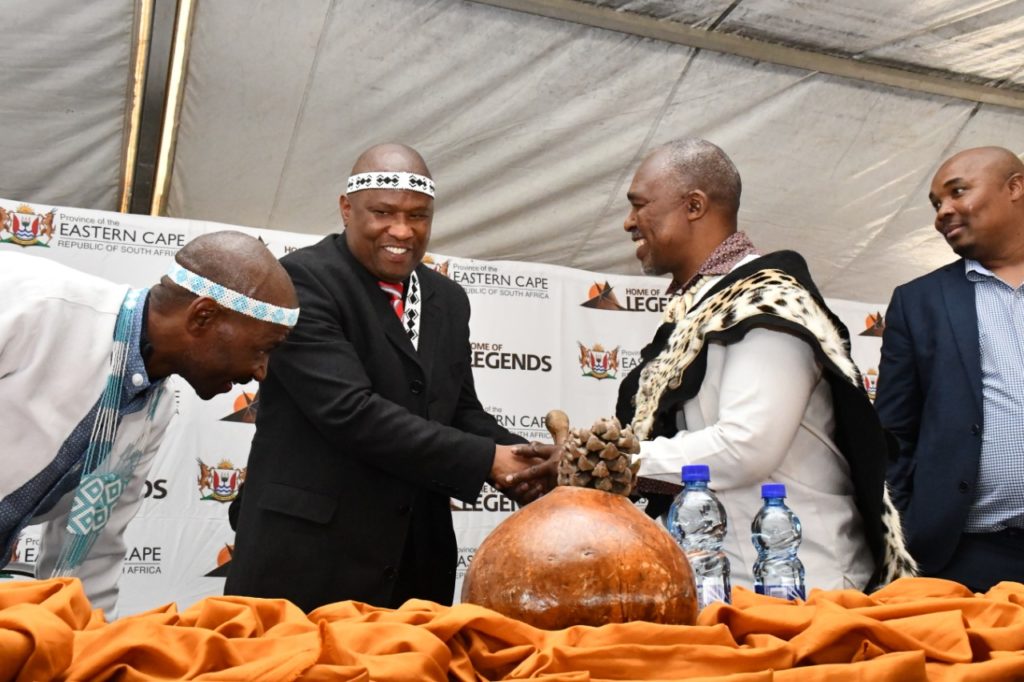
Eastern Cape Premier, Lubabalo Oscar Mabuyane used his speech at the Provincial Heritage day to call for the use of and preservation of African mother tongue languages to preserve the diverse heritage of the people of South Africa.
Speaking at the Dutywa Sports ground on a day that looked more like a winter’s day than a bright spring day- owing to the chilly weather conditions – Mabuyane said African mother tongue languages are a critical element of culture and heritage of the people forming part of a basis for ethnic, regional, national and international identity.
“Government continues to promote use and preservation of mother tongue languages of the people of the province like isiXhosa, IsiZulu, Sesotho and SePedi so that they are not distinct. In this province, isiXhosa is spoken by the majority of the people showing significance of the importance of promotion and preservation of this and other mother tongue languages,” said Mabuyane.
He added that it was important for government and its employees to use African mother tongue languages in official communication more than the dominant use of English.
“That is why we are promoting use of isiXhosa in the province and nationally, because we also know that previous oppressive regimes deliberately undermined use of African mother tongue languages immorally promoting use of English and Afrikaans at the expense of African languages. There is a lot of work that we have to do to uproot trunks of undermining African mother tongue languages so that we all appreciate mother tongue languages and stop only prioritising the use of the English language,” said Mabuyane.
Mabuyane called on institutions of higher learning and organisations promoting cultural and heritage development programmes to promote the use of mother tongue languages in the province.
Speaking at the same event, Cecilia Nkopane, of the Bakwena royal family from Herschel, said she loves seSotho, her mother tongue language because it is about her identity as a seSotho speaking person.
“It is important that people understand each other’s mother tongue languages so that we are able to communicate with each other, understand our communication using our mother tongue languages. This makes us understand our diverse cultures, heritage and identity as the people of this country. For instance, as I am here in Dutywa I am able to communicate with isiXhosa speaking people,” said Nkopane.
Masithembe Dingiswayo, who leads the Zimvelo Zesizwe dance group from Ngcingwane outside Dutywa, said, “Each person must be proud of their African mother tongue language, be proud of their identity and as umXhosa, be proud of being umXhosa. You need to be confident of who you are. It is important that we know each other’s mother tongue languages because Nelson Mandela liberated us from oppression so that we know and understand all languages. What I like about my mother tongue language is that I know isiXhosa and I am proud of being umXhosa.”
With his group dancing a diverse bouquet of dance moves inspired by isiXhosa, isiMpondo and isiZulu music and cultures, reflecting the diverse cultural heritage of the country, Dingiswayo said their group wanted their cultural production to be known while they also contribute in reducing crime in communities.
The Provincial heritage event was attended by scores of communities mainly from Amatole district municipality, representatives of traditional leaders led by amaXhosa King, Zwelonke Sigcawu and provincial government MECs.
Sigcawu said the proper use of African mother tongue languages was important for the people and there was a need to call in language experts to help the current generation which is losing the grip and understanding of African mother tongue languages.
“Using African mother tongue languages, preserving culture, traditions and heritage is important because it solidifies relationships in society. Even developed and totally liberated nations, as we yet to be fully liberated and developed, if we can stick to heritage, culture and languages, we would be a successful nation,” he said.


